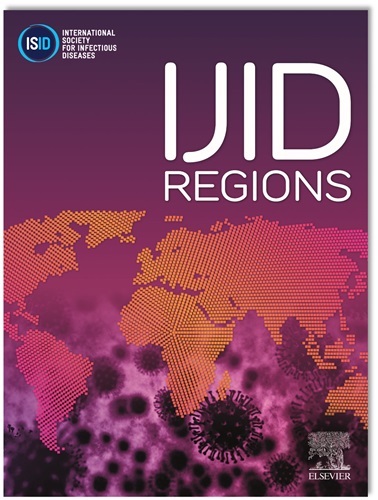Autoantibodies directed against interferon alpha, nuclear antigens, cardiolipin, and beta 2 glycoprotein 1 are not induced by SARS-CoV-2 or associated with long COVID
IF 4.8
2区 医学
Q1 INFECTIOUS DISEASES
引用次数: 0
Abstract
Introduction
Autoantibodies (AAbs) directed against interferon alpha (aIFNα), nuclear antigens (ANAs), anti-cardiolipin (aCL), and anti-beta 2 glycoprotein 1 (aβ2GP1), have been demonstrated to significantly correlate with the severity of acute Coronavirus Disease 2019 (COVID-19). However, whether severe acute respiratory syndrome coronavirus 2 (SARS-CoV-2) infection induces these AAbs and whether they are associated with long COVID remains unclear.
Methods
The potential induction of aIFNα, ANAs, aCL, and aβ2GP1 by SARS-CoV-2 was assessed by measuring these AAbs in 224 pre- and post-infection paired serum samples from the Johns Hopkins Hospital Emergency Department (JHHED). The relationship between these AAbs and long COVID was assessed using 60 serum samples from participants in the Outpatient SARS-CoV-2 Mild and Asymptomatic Infection Response and Transmission study.
Results
We found no evidence that these AAbs were induced in the JHHED cohort and no significant difference in their prevalence between patients with (n = 30) and without (n = 30) long COVID in the OutSMART cohort.
Conclusion
These findings do not support the hypotheses that SARS-CoV-2 induces these AAbs or that they are related to long COVID.
针对α干扰素、核抗原、心磷脂和β2糖蛋白1的自身抗体并非由SARS-CoV-2诱发,也与长COVID无关。
导言:针对α干扰素(aIFNα)、核抗原(ANA)、心磷脂(aCL)和β2糖蛋白1(aβ2GP1)的自身抗体(AAbs)已被证实与急性COVID-19的严重程度显著相关。然而,SARS-CoV-2 感染是否会诱导这些 AAbs 以及它们是否与长 COVID 相关仍不清楚:方法:通过测量约翰霍普金斯医院急诊科(JHHED)224 份感染前和感染后配对血清样本中的 AAbs,评估 SARS-CoV-2 可能诱导 aIFNα、ANAs、aCL 和 aβ2GP1。我们使用门诊 SARS-CoV-2 轻度和无症状感染反应与传播(OutSMART)研究参与者的 60 份血清样本评估了这些 AAbs 与长 COVID 之间的关系:结果:我们没有发现证据表明这些 AAbs 在 JHHED 队列中被诱导,而且在 OutSMART 队列中,长 COVID 患者(30 人)和无长 COVID 患者(30 人)之间的 AAbs 感染率也没有显著差异:这些发现并不支持 SARS-CoV-2 会诱发这些 AAbs 或它们与长 COVID 有关的假设。
本文章由计算机程序翻译,如有差异,请以英文原文为准。
求助全文
约1分钟内获得全文
求助全文
来源期刊
CiteScore
18.90
自引率
2.40%
发文量
1020
审稿时长
30 days
期刊介绍:
International Journal of Infectious Diseases (IJID)
Publisher: International Society for Infectious Diseases
Publication Frequency: Monthly
Type: Peer-reviewed, Open Access
Scope:
Publishes original clinical and laboratory-based research.
Reports clinical trials, reviews, and some case reports.
Focuses on epidemiology, clinical diagnosis, treatment, and control of infectious diseases.
Emphasizes diseases common in under-resourced countries.

 求助内容:
求助内容: 应助结果提醒方式:
应助结果提醒方式:


